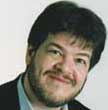
Jeff Jacoby
The liberal terminology of abortion
http://www.NewsAndOpinion.com | A federal judge in San Francisco last week struck down as unconstitutional a recent federal law that bans partial-birth abortion. Or is that what it bans? Consider how the illegal procedure was identified in news accounts of last week's ruling:
![]() Newsday: "Doctors call it intact dilation and extraction but abortion foes refer to it as `partial-birth abortion.' "
Newsday: "Doctors call it intact dilation and extraction but abortion foes refer to it as `partial-birth abortion.' "
![]() National Public Radio: "Partial-birth abortion is a term used by opponents for what doctors call intact dilation and extraction."
National Public Radio: "Partial-birth abortion is a term used by opponents for what doctors call intact dilation and extraction."
![]()
![]() NBC: A federal judge declared the so-called `partial-birth abortion' act unconstitutional on Tuesday.
NBC: A federal judge declared the so-called `partial-birth abortion' act unconstitutional on Tuesday.
![]() San Francisco Chronicle: "The ruling deals with what opponents call `partial-birth abortion.' "
San Francisco Chronicle: "The ruling deals with what opponents call `partial-birth abortion.' "
Why the circumlocutions? In journalism, short and clear is better than long and wordy; reporters generally don't have the space or time to reach for periphrastic phrasings when something more direct is available. Yet when it comes to partial-birth abortion, many of them suddenly feel compelled to distance themselves from a familiar and straightforward term. Why?
The answer most journalists would give, I imagine, is that they are just being accurate. "Partial-birth abortion" isn't a proper medical term, they would argue — the phrase was originally coined by prolife activists and it's appropriate to point out the political baggage it comes with.
Which is fair enough — but only if the same standard applies across the board. "Choice" and "the right to choose," the most common euphemisms for abortion, aren't medical terms either. They come straight out of the abortion rights lexicon, which adopted them for their favorable connotation. But when was the last time a news report mentioned, say, a candidate's stand "on what abortion activists call `choice' but doctors refer to as suction curretage or dilation and evacuation"?
For that matter, when was the last time a news report spotlighted the political provenance of any label other than "partial-birth abortion"? After all, it isn't only in the abortion wars that terminology can have partisan overtones. If it's a matter of good journalism to call attention to the fact that a phrase tends to favor those on one side of a controversial issue, shouldn't reporters be more fastidious about using terms like "campaign finance reform" or "the gun lobby?" Shouldn't they point out the implicit bias in referring to only some violent offenses as "hate crimes?"
When legislation to ban guns bearing certain cosmetic features is proposed, journalists should note that the measure would restrict "what opponents call `assault weapons,' a term not used by weapons experts, who say it has no clear meaning." When reporting on the same-sex marriage controversy, they should observe that "what critics call `homophobia' — a term promoted by gay and lesbian activists — is not recognized by medical authorities."
But they don't. Because the real issue here isn't accuracy, it's political ideology.
What impels many journalists to instinctively pooh-pooh "partial-birth abortion" as a locution favored by abortion opponents is that most of them are abortion supporters. When researchers Stanley Rothman and Amy Black surveyed members of the media elite — which they defined as "reporters and editors at major national newspapers, newsmagazines, and wire services" — they found that 97 percent described themselves as prochoice and 84 percent said it was a view they held strongly. The term "partial-birth abortion" offends them not because it is inaccurate — it isn't — but because it is harmful to a cause they favor.
On the other hand, terms like "campaign finance reform," "assault weapons," and "homophobia" raise few red flags in the newsroom not because they are accurate — they aren't — but because they tend to reinforce the liberal political outlook most American journalists share.
Survey after survey confirms that Americans are ambivalent about abortion generally. A clear majority believes that most abortions are wrong, but an equally clear majority is opposed to making most abortions illegal.
That ambivalence vanishes when it comes to partial-birth abortion. The public agrees with the late Daniel Patrick Moynihan, who said it was "as close to infanticide as anything I have come upon." It is a gruesome, hideous, indefensible procedure — and Americans know it. Which helps explain why the House and Senate voted 2-1 to ban them.
When the media tag "partial-birth abortion" as a label favored by "foes" and "critics" and "opponents," it is their own readers and viewers they're referring to. The media may not realize that. Those readers and viewers do.
Like this writer's work? Why not sign-up for the daily JWR update. It's free. Just click here.
Jeff Jacoby is a Boston Globe columnist. Comment by clicking here.


